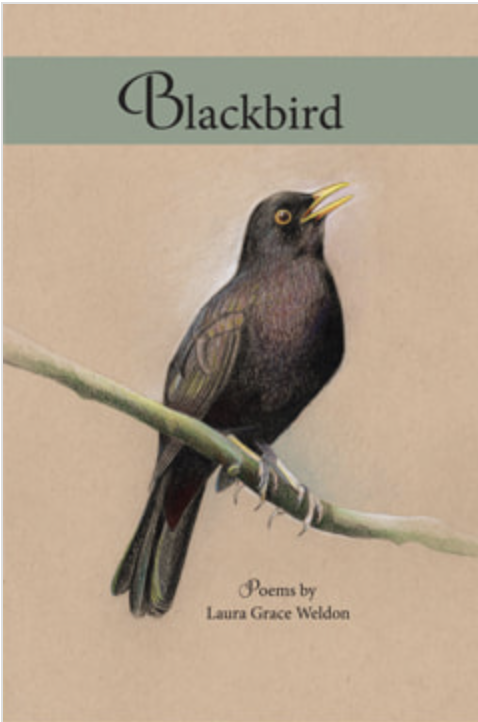Blackbird: Poems by Laura Grace Weldon (West Hartford, CT: Grayson Books, 2019) $15.95

The first time I read Laura Grace Weldon’s latest book of poems, Blackbird, I gulped it down all at once like a starved reader. I kept finding poems to fall in love with, lines that made me say, oh, wow, me too. I’ve felt exactly that, keep tissues around for that (Overflow). Oh, there is a name for that feeling (Call of the Void). Yes, yes, this is what mothers do (Overflow – again, Notice to Fibromuscular Dysplasia, Subdural Hematoma, How to Soothe, After Play). Oh, god, I love this world, too (Common Ground, November Morning at Dawn, Feral, Astral Chorus). I wish everyone loved this world and each other (Post Hoc, Ergo Propter Hoc; Border Children in the News), wish privilege recognized its own pompous damage (Adjunct Accidentally Invited to the Club, Fine Furniture). We can do better starting now (the whole damn book). And I thought, yes, this is what poetry is supposed to do: make us feel like we’ve found nourishment we weren’t even aware we needed. Make us feel connected to this world that offers so much, if we would just pay attention. Make us feel grateful.
The second time I read Blackbird, I savored it. I sunk into the idea of connectedness that is presented in the very first poem, Earthbound:
The oneness between self and everything
is this planet’s secret, kept imperfectly.
This is the very glue of this book. Oneness with everything – our families, our neighbors, the prisoners and children and battered women, the cow who lays down to die after 17 years of offerings, the coyotes and birds and beech trees, the oracles that come to us through everyday objects, the bee that leaves her stinger in the bottom of our foot. These poems draw an ever-expanding circle of life that includes even the smallest organisms. There is no part of this life on earth that does not offer something for us, some insight or comfort or magic. How can we not be grateful?
And how can we not feel compassion for this earth and its beings, especially the damaged, the scarred, the ones in search of sanctuary? How can we not rethink our time here when its meaning shifts after a new medical diagnosis or a death? To understand how much there is to be grateful for is to also understand grief, loss, cruelty, fate, and to wield the bravery that allows passage through those difficulties. We have power to claim, as Clarion Reminder tells us:
The powerful provoke the powerless
to push against one another.
Their power grows by keeping us
in all kinds of prisons.
Yet we are not powerless.
When we rise up and gather our strength, as in Notice to Fibromuscular Dysplasia, we draw on power well beyond our own, especially when we are protecting our children:
I am a tornado, earthquake, tsunami,
I will knock your house into splinters.
I will drown you in my tides.
I will drop you into a fissure so deep
you won’t hear yourself cry for mercy.
I am the will of every mother
in every eon’s arduous crawl from sea to land.
Fierce love is an unbreakable bond. It is also the tissue connecting tender moments that lay bare our humanity. We treasure our memories, even as we leave them behind as in Moving Day:
The new people don’t know
we tucked blessings behind these walls.
On bare beams the kids crayoned
bubble-face stick figures
and I wrote poems
in thick black marker, dizzied
by vapors that make words permanent.
Power, love, grief, gratitude. We use all of it to become complete human beings, like compost, as in Compost Happens:
Nature teaches nothing is lost.
It’s transmuted.
All that hard-won wisdom and gratitude and love brings us to the final poem in the collection, Anything, Everything. The poem closes the circle opened in the first poem. It reminds us of our “planet’s highest possibilities” and encourages us to start there. I would also suggest, as in the poem Post Hoc, Ergo Propter Hoc, that we summon our will, like witches, to bring about a better reality. We have nothing and everything to lose.
To purchase a copy of Blackbird, visit https://www.graysonbooks.com/blackbird.html. A portion of the royalties will be donated to the Medina Raptor Center of Spencer, Ohio, where injured birds are rescued, rehabilitated, and released.
Laura Grace Weldon’s work has appeared in Gyroscope Review issues 17-1 and 19-1.